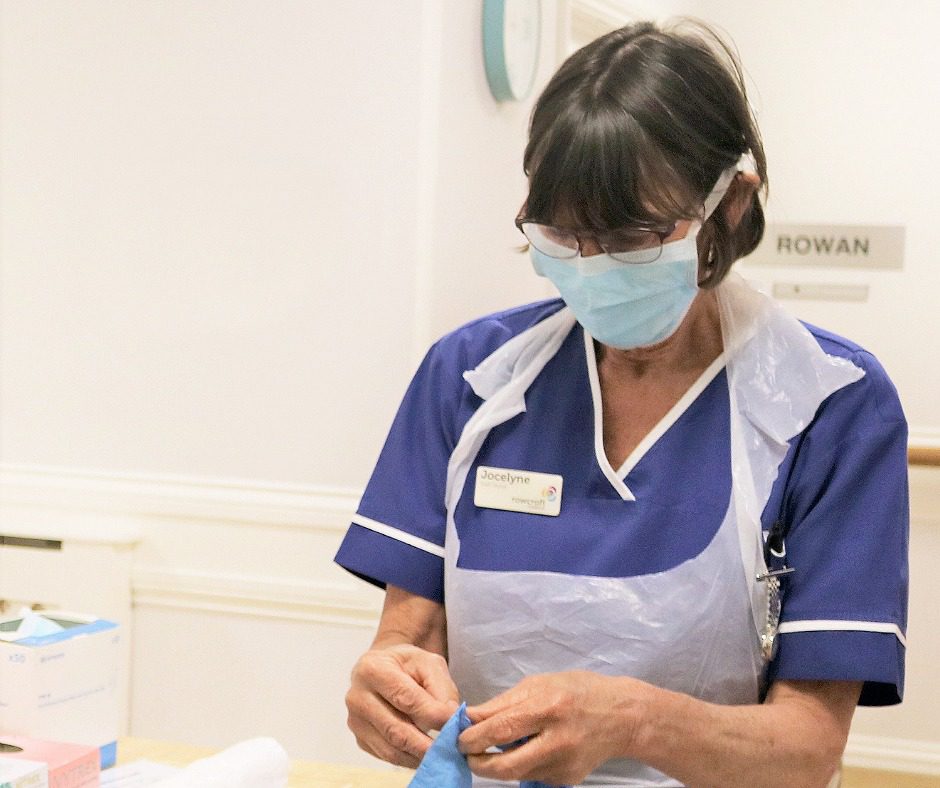While we have achieved a great deal in responding so quickly to the many challenges posed by the global COVID crisis, our clinical teams are still under great pressure. Our commitment to provide expert care remains unaltered, yet the pandemic has changed many aspects of the way we care for our patients and families.
To keep everyone safe, our infection-prevention strategy is critical for our practice and has been implemented across all our clinical services in many different ways including:
- creating a separate isolation area in our Inpatient Unit, for any patient who develops symptoms of COVID after admission, or if they’ve been admitted prior to having their COVID test results back. This has meant that we don’t have to turn away end-of-life patients, and we can ensure the safety of others on the ward.
- using all the appropriate personal protective equipment (PPE). The use of PPE has come with its own set of difficulties, particularly because it goes against the grain of some of the things we hold dear in comforting and caring for our patients and families. For example, reassuring a patient by holding their hand just isn’t the same when wearing latex gloves. Masks hide facial expressions and smiles – which usually go such a long way in helping staff to connect with our patients and families. Many of our patients and family members have hearing difficulties and face coverings cause an additional challenge in communicating when they rely on lip reading.
- protecting our patients and families from any risk of COVID by limiting face-to-face visits, and replacing them with remote consultations. We’ve fast-tracked the use of the AccuRX video platform to carry out remote consultations with patients via video link. In our usual way, we are providing compassionate care, timely symptom management and support to patients and their families, while remaining considerate of the increased anxiety being felt as a result of this global crisis.
- providing support to bereaved families via telephone consultations rather than face-to-face. Our Bereavement Team have found telephone consultations to be highly effective in providing much-needed support.
- holding online funeral services if gathering was not an option; and helping patients in the Inpatient Unit to use iPads and mobile phones to connect with shielding family members.
- adapting our complementary therapy service to enable us to offer ‘touch’ therapies such as massage while still being COVID safe, and providing online relaxation sessions.
- adapting the delivery of our education in end-of-life care to be predominantly on-line, and continuing to provide much-needed support to other health and social care professionals including NHS community colleagues, and nurses working in care homes and for domiciliary agencies.
Over recent months, Rowcroft has responded to an escalating demand for our care. Our Hospice at Home service – which provides end-of-life care to people in their own homes across 300 square miles of South Devon – has been flooded by a surge in demand; and referrals to our Community Team – which offers services encompassing clinical nurse specialists, specialist palliative care doctors, physiotherapy, occupational therapy and bereavement support – are also steadily rising to extremely high levels. We will do everything we can to keep up with demand. However, over the last few months, there have sadly been times when we’ve needed to close our referrals, as we sometimes don’t have the capacity to provide care for everyone who needs it.
To meet these increasing challenges, we have redeployed staff from within the organisation to support our clinical services, and we have adopted a highly successful superfluid model of nursing, whereby staff assist across teams wherever the need is greatest.
Throughout all this, we have continued to put patients’ choices at the very centre of everything we do, encouraging patients to be actively involved in decisions about the type of care they receive, believing this to be a prerequisite for expert, sensitive end-of-life care.
Despite our success in responding effectively and swiftly to the challenges of the pandemic, we know that as the winter approaches, we will need to work even harder to keep the momentum going. We will need to build on what we have achieved so far, and continue to learn and adapt so that we can carry on providing the best care possible to our patients and families.

